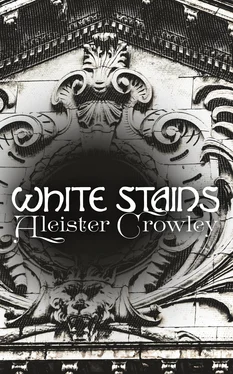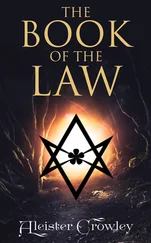He told Mathilde Doriac that he had been to Eton and Cambridge - neither institution, however, preserves any record of such admission. The imagination of George, indeed, is tremendously fertile with regard to events in his own life. His own story is that he entered Trinity College, Cambridge, in 1856, and was sent down two years later for an article which he had contributed to some University or College Magazine. No confirmation of any sort is to be found anywhere with regard to these or any other statements of our author. There is, however, no doubt that in 1861 he quarrelled with his family; went over to Paris, where he settled down, at first, like every tufthead, somewhere in the Quartier Latin; later, with Mathilde Doriac, the noble woman who became his mistress and held to him through all the terrible tragedy of his moral, mental, and physical life, in the Rue du Faubourg-Poissonniere. At his house there the frightful scenes of '68 took place, and it was there too that he was apprehended after the murders which he describes so faithfully in 'Abysmos'. He had just finished this poem with a shriek of triumph, and he had read it through to the appalled Mathilde 'avec des yeux de flamme et de gestes incoherentes', when, foaming at the mouth, and 'hurlant de blasphemes indicibles', he fell upon her with extraordinary violence of passion; the door opened, officers appeared, the arrest was effected. He was committed to an asylum, for there could be no longer any doubt of his complete insanity; for three weeks he had been raving with absinthe, and satyriasis. He survived his confinement no long time; the burning of the asylum with its inmates was one of the most terrible events of the war of 1870.
So died one of the most talented Englishmen of his century, a man who for wide knowledge of men and things was truly to be envied, yet one who sold his birthright for a mess of beastlier pottage than ever Esau guzzled, who sold soul and body to Satan for sheer love of sin, whose mere lust of perversion is so intense that it seems to absorb every other emotion and interest.
Never since God woke light from chaos has such a tragedy been unrolled before men, step after step toward the lake of Fire!
At his house all his writings were seized, and, it is believed, destroyed. The single most fortunate exception is that of a superbly jewelled writing-case, now in the possession of the present editor, in which were found the MSS. which are here published. Mathilde, who knew how he treasured its contents, preserved it by saying to the officer, 'But, sir, that is mine.'
On opening this it was found to contain, beside these MSS., his literary will. All MSS. were to be published thirty years after his death, not before. He would gain no spurious popularity as a reflection of the age he lived in. 'Tennyson,' he says, 'will die before sixty years are gone by : if I am to be beloved of men, it shall be because my work is for all times and all men, because it is greater than all the gods of chance and change, because it has the heart of the human race beating in every line. This is a patch of magenta to mauve, undoubtedly; but - ! The present collection of verses will hardly be popular; if the lost works turn up, of course it may be that there may be found 'shelter for songs that recede.' Still, even here, one is, on the whole, more attracted than repelled; the author has enormous power, and he never scurples to use it, to drive us half mad with horror, or, as in his earlier most exquisite works, to move us to the noblest thoughts and deeds. True, his debt to contemporary writers is a little obvious here and there; but these are small blemishes on a series of poems whose originality is always striking, and often dreadful, in its broader features.
We cannot leave George Bishop without a word of enquiry as to what became of the heroic figure of Mathilde Doriac. It is a bitter task to have to write in cold blood the dreadful truth about her death. She had the misfortune to contract, in the last few days of her life with him, the same terrible disease which he describes in the last poem of this collection. This shock, coming so soon after, and, as it were, as an unholy perpetual reminder of the madness and sequestration of her lover, no less than of his infidelity, unhinged her mind, and she shot herself on July 5th, 1869. Her last letter to Madame J... S... is one of the tenderest and most pathetic ever written. She seems to have been really loved by George, in his wild, infidel fashion: 'All Night' and 'Victory', among others, are obviously inspired by her beauty; and her devotion to him, the abasement of soul, the prostitution of body, she underwent for and with him, is one of the noblest stories life has known. She seems to have dived with him, yet ever trying to raise his soul from the quagmire; if God is just at all, she shall stand more near to His right hand than the vaunted virgins who would soil no hem of vesture to save their brother from the worm that dieth not!
The Works of George Archibald Bishop will speak for themselves; it would be both impertinent and superfluous in me to point out in detail their many and varied excellences, or their obvious faults. The raison d'etre, though, of their publication, is worthy of especial notice. I refer to their psychological sequence, which agrees with their chronological order. His life-history, as well as his literary remains, gives us an idea of the pro- gression of diabolism as it really is; not as it is painted. Note also, (1) the increase of selfishness in pleasure, (2) the diminution of his sensibility to physical charms. Pure and sane is his early work; then he is carried into the outer current of the great vortex of Sin, and whirls lazily through the sleepy waters of mere sensualism; the pace quickens, he grows fierce in the mysteries of Sapphism and the cult of Venus Aversa with women; later of the same forms of vice with men, all mingled with wild talk of religious dogma and a general exaltation of Priapism at the expense, in particular, of Christianity, in which religion, however, he is undoubtedly a believer till the last (the pious will quote James 2, 19, and the infidel will observe that he died in an asylum); then the full swing of the tide catches him, the mysteries of death become more and more an obsession, and he is flung headlong into Sadism, Necrophilia, all the maddest, fiercest vices that the mind of fiends ever brought up from the pit. But always to the very end his power is unexhausted, immense, terrible. His delirium does not amuse; it appals! A man who could conceive as he did must himself have had some glorius chord in his heart vibrating to the eternal principle of Boundless Love. That this love was wrecked is for me, in some sort a relative of his, a real and bitter sorrow. He might have been so great! He missed Heaven! Think kindly of him!
Table of Contents
You crown me king and queen. There is a name
For whose soft sound I would abandon all
This pomp. I liefer would have had you call
Some soft sweet title of beloved shame.
Gold coronets be seemly, but bright flame
I choose for diadem; I would let fall
All crowns, all kingdoms, for one rhythmical
Caress of thine, one kiss my soul to tame.
You crown me king and queen; I crown thee lover!
I bid thee hasten, nay, I plead with thee,
Come in the thick dear darkness to my bed.
Heed not my sighs, but eagerly uncover,
As our mouths mingle, my sweet infamy,
And rob thy lover of his maidenhead.
Lie close; no pity, but a little love.
Kiss me but once and all my pain is paid.
Hurt me or soothe, stretch out one limb above
Like a strong man who would constrain a maid.
Touch me; I shudder and my lips turn back
Over my shoulder if so be that thus
My mouth may find thy mouth, if aught there lack
Читать дальше












